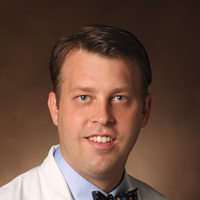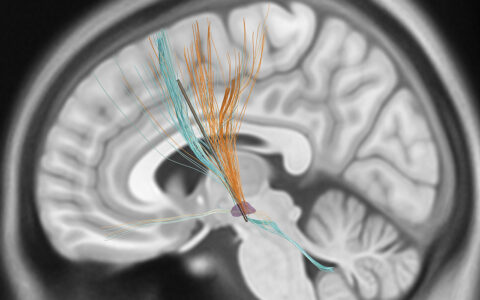Huntington’s disease (HD) is a devastating diagnosis and effective treatment includes both expert clinical care and patient-based social services. Under the comprehensive care model recommended by the Huntington’s Disease Society of America (HDSA) Centers of Excellence program, patients benefit from team-based treatment by specialists including neurologists, psychiatrists, therapists and counselors with expertise working with families affected by HD.
“Huntington’s disease is an emotionally-charged diagnosis,” said Daniel Claassen, M.D., associate professor of Neurology at Vanderbilt University and Director of Vanderbilt University Medical Center’s interdisciplinary Huntington’s Disease and Chorea Clinic, an HDSA Center of Excellence. “Patients often don’t know anything about the disease. Our goal is to break down the barriers.”
“Huntington’s disease is an emotionally-charged diagnosis. Patients often don’t know anything about the disease. Our goal is to break down the barriers.”
The Vanderbilt clinic offers family, insurance and disability support as well as personal and general support groups. “Our clinic aims to help HD patients and their families obtain the best care program throughout the life cycle of the disease—from genetic counseling to pediatric neurology, from disease management to palliative care,” Claassen said.
Genetic Testing and Counseling
HD is an autosomal-dominant inherited disease, now known to be caused by repetition of the nucleotides cytosine-adenine-guanine (CAG) in a specific gene. Discovery of the HD gene has led to a simpler, less expensive and far more accurate presymptomatic genetic test for at-risk individuals using CAG repeat length to detect the presence of the HD mutation in blood.
At-risk individuals who are considering genetic testing should do so at a testing center that follows the HDSA guidelines. However, there are risks, which may include changes in the individual’s perception of self, relationship stresses, discrimination, difficulties obtaining or keeping insurance and other concerns related to privacy and confidentiality. “It’s a tough decision to get tested, but the earlier a patient is diagnosed, the earlier we can get them into counseling, treatment and clinical trials,” Claassen said.
Connecting Patients to Research
Vanderbilt’s clinic helps patients contribute meaningfully to HD research and to gain access to innovative therapies. The clinic is a site for ENROLL-HD, a global multi-center longitudinal observational study of HD. The study encompasses 16 nations and 156 clinical sites, with a goal to reach 20,000 active enrollees. Goals are to provide a platform to support the design and conduct of clinical trials and to improve understanding of how the phenotypic spectrum changes over time and the disease mechanisms of HD.
“ENROLL offers the opportunity for every patient—no matter where they are—to be involved in research,” Claassen said. “They like the fact that by sharing their experiences, they may impact the lives of other people with HD.”
Vanderbilt currently participates in several innovative trials. It is one of a few sites in the world involved in PRECISION-HD, trials to test new compounds targeting the underlying genetic cause of Huntington’s disease, as well as SIGNAL, a trial of an immunotherapy-based compound that may halt HD progression.
“Research is a cornerstone of the comprehensive care model,” Claassen explained. “At Vanderbilt, we strive to bridge the gap between basic science and patient care. Monthly, our HD clinicians and basic science researchers meet in an educational forum. Basic scientists love hearing about the clinical aspects of HD, and clinicians love hearing from scientists who are working with mouse models.”
Extending Patient Support
Ultimately, it’s patient support that is most critical in HD. The Vanderbilt HD program has established a multi-collaborative network for HD support, including full-service clinics at the University of Tennessee in Knoxville and Erlanger in Chattanooga. Each clinic offers education for patients and families, support groups and ongoing counseling. In addition to these satellite clinics, telehealth has become an option for patients in long-term care.
“These are patients who can’t get out of their wheelchairs to come to the clinic,” Claassen said. “This is a way for us to observe their progression and provide ongoing counseling and care.”
Future Directions
Vanderbilt was the highest-enrolling participant in the clinical trial of a novel compound, deutetrabenazine, which was approved by the FDA in early 2017. Deutetrabenazine extends active half-lives and minimizes drug concentration fluctuations, allowing patients to take less frequent doses. “It was rewarding to see a trial go all the way to FDA approval and to hear patients say, ‘I feel great!’” Claassen said.
Claassen hopes for better advocacy, social changes and better overall healthcare support for HD. But most of all, he hopes for better treatments. The goal is to alter the biology of neurodegeneration and change the clinical manifestation. “If I can delay the inevitable manifestation of HD for ten years, I’ve just given someone another ten years to be a dad or a mom.”





